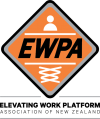Training
Nationally Recognised Operator Qualification (NZQA)
The EWPA supports and endorses “Nationally recognised” unit standards for operator competency assessment, delivered by trusted Training Companies throughout New Zealand. NZQA unit standards are registered against the individuals record or learning and held for life. Following the requirements of the BPG, operators should undertake refresher training every three (3) years. These unit standards define the core requirements of competency and the trainer/assessor's moderation process ensures the content delivered is of a high standard and consistent across the country. This ensures PCBUs and employers that operators are trained and assessed to operate safely. It is essential to choose training based on NZQA unit standards.
Other Training
There are other NZQA unit standards for electrical utilities, arboriculture and horticulture MEWP operation training, these are extended training courses following the achievement of the core MEWP unit standards. You must be trained and assessed as competent in the MEWP type prior to carrying out these functions and training. Further, there is task-specific and related industry unit standards that can benefit your operational competencies. Heights training, specifically US 23229 Safe use of Harness is a requirement if you wish to train in a boom type MEWP.
Since the release of the Best Practice Guidelines for MEWP in August 2014, the EWPA has fielded numerous inquiries regarding EWP Operator Training, most questions relate to what the requirements are for such training. The short answer is that the Health and Safety at Work Act 2015 informs you that you must train your staff on the equipment they are using. So, even though licensing is not mandatory in New Zealand, machinery operator training most certainly is.
The Good Practice Guideline can be downloaded here, and section 6 of the guidelines state the following;
The MEWP operator training should cover at least:
- Legal requirements and guidance.
- Getting to know the operator’s manual.
- Hazard management – identifying, assessing and controlling hazards.
- Equipment and safety features.
- Prestart (pre-operational) inspection.
- Use of logbooks.
- Control functions and positions.
- Limits of the machine – rated capacity, wind rating – and machine weight.
- Safe operation, moving and positioning a MEWP.
- Transporting – including loading and unloading (where required).
- Working near overhead power lines.
- Using a harness.
- Refuelling, tools and battery charging.
- Reporting problems and incidents.
- Emergency retrieval systems.
- Emergency rescue plan.
For the purposes of operating a MEWP, a competent person is a person who has achieved and demonstrated competency in the safe use of a particular type of MEWP.
Competent operator of a MEWP should:
- Be able to safely and correctly perform the tasks required of them.
- Be able to identify when they cannot perform a task due to insufficient knowledge or skill.
- Be able to effectively communicate.
- Be able to provide appropriate records of training, qualification and experience - An employer or principal, who tells someone to use a MEWP, must make sure that the operator is adequately trained by a competent person and can demonstrate their competency before using any equipment. The operator must get training on the type of MEWP they will be using. The operator must be supervised during the training period until the person is considered competent to operate the MEWP.
- Be physically able to undertake the appointed tasks.
- Be able to identify and manage the risks of a task.
- Be able to recognize unsafe practices.
- Have the knowledge to assess a task and follow a work plan.
- Be able to recognize activities or tasks that lie outside their competence.
- Understand how the MEWP and its equipment are to be used safely.
- Know the risks of using a MEWP and the possible incidents that could occur.
- Know that the MEWP should not be used as a crane or personnel lift unless specifically designed for that purpose.
- Be able to implement the work plan and the rescue plan.
- Know the inspection and maintenance requirements to ensure the MEWP is in a suitable working condition, including pre-use checks.
- Know how to access the inspection and maintenance documentation, for example in the logbook.
- Be able to implement exclusion zones as necessary to keep the MEWP separate from pedestrians, machinery and vehicles.
- Know the requirements to operate near hazards, including power lines.
One means of demonstrating competency is by completing an Operator Training Course that provides NZQA Qualifications to the trainee/ MEWP operator. All training courses must cover the requirements of AS2550.10: Cranes, Hoists and Winches – Safe Use – Mobile Elevating Work Platforms and course providers should be able to offer evidence of this. Competency should also be assessed through supervision during the use of the equipment.
A MEWP operator must also be able to demonstrate that they have the Knowledge, Skills and Behaviours needed to effectively carry out a hazard and risk assessment in their operating location.
At the end of the day, in the (hopefully not) event of an incident, you will need to provide evidence of effective training that matches the requirements of the Health & Safety at Work Act and the BPG. Don't settle for anything less than NZQA unit standard based training and assessment.
If you need training, make sure you use a EWPA member company. Find an EWPA Member Training Company.
If you have any questions or need advice in relation to the above, please contact the Association on 07 5752563.
